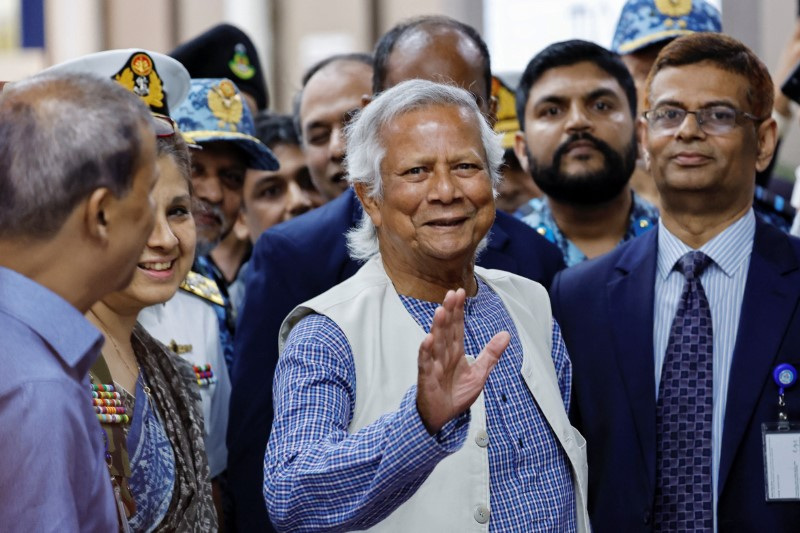By Ruma Paul
DHAKA (Reuters) -Nobel Peace laureate Muhammad Yunus returned house to strife-torn Bangladesh on Thursday, to guide a brand new interim authorities after weeks of tumultuous scholar protests pressured Prime Minister Sheikh Hasina to resign and flee to neighbouring India.
The South Asian nation’s solely Nobel laureate and a harsh critic of Hasina, Yunus, 84, arrived in Dhaka following medical therapy in Paris, after protesters backed him for the function in a authorities tasked with holding elections for a brand new chief.
“I feel good coming back home,” the economist stated on the airport, the place he was greeted by prime navy officers and scholar leaders.
The scholar protesters had saved the nation and that freedom needed to be protected, he stated, including, “Whatever path our students show us, we will move ahead with that.”
Yunus is ready to be sworn in as chief of a group of advisers at 1430 GMT, on the official residence of President Mohammed Shahabuddin.
Hasina’s Awami League celebration doesn’t determine within the interim authorities after she resigned on Monday, following weeks of violence that killed about 300 folks and injured hundreds.
In a Fb (NASDAQ:) submit, her son Sajeeb Wazed Pleasure stated the celebration had not given up, nevertheless, and was prepared to carry talks with opponents and the interim authorities.
“I had said my family will no longer be involved in politics but the way our party leaders and workers are being attacked, we cannot give up,” he stated on Wednesday.
Yunus, generally known as the ‘banker to the poor’, obtained the 2006 Nobel Peace Prize for founding a financial institution that pioneered the battle on poverty by means of small loans to needy debtors.
Hasina’s dramatic exit from the nation she dominated for 20 of the final 30 years, profitable a fourth straight time period in January, triggered jubilation and violence as crowds stormed and ransacked her official residence unopposed.
She is sheltering at an air base close to New Delhi, the Indian capital, a growth that Yunus stated sparked anger at India amongst some Bangladeshis.

The scholar-led motion that ousted Hasina grew out of protests towards quotas in authorities jobs that spiralled in July, scary a violent crackdown that drew international criticism, although the federal government denied utilizing extreme power.
The protests had been fuelled additionally by harsh financial circumstances and political repression within the nation, born after a struggle of liberation from Pakistan in 1971.




